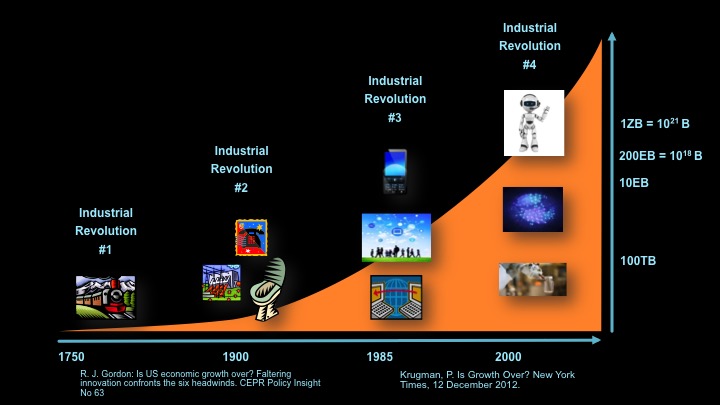 I had some interesting new talking points in my Rock Stars of Big Data talk this week. On the same day, MIT Technology Review published Technology and Inequality by David Rotman that surveys the link between a growing wealth divide and technological change. Part of my motivating argument for Big Data is that intelligent systems are likely the next industrial revolution via Paul Krugman of Nobel Prize and New York Times fame. Krugman builds on Robert Gordon’s analysis of past industrial revolutions that reached some dire conclusions about slowing economic growth in America. The consequences of intelligent systems on everyday life will have enormous impact and will disrupt everything from low-wage workers through to knowledge workers. And how does Big Data lead to that disruption?
I had some interesting new talking points in my Rock Stars of Big Data talk this week. On the same day, MIT Technology Review published Technology and Inequality by David Rotman that surveys the link between a growing wealth divide and technological change. Part of my motivating argument for Big Data is that intelligent systems are likely the next industrial revolution via Paul Krugman of Nobel Prize and New York Times fame. Krugman builds on Robert Gordon’s analysis of past industrial revolutions that reached some dire conclusions about slowing economic growth in America. The consequences of intelligent systems on everyday life will have enormous impact and will disrupt everything from low-wage workers through to knowledge workers. And how does Big Data lead to that disruption?
Krugman’s optimism was built on the presumption that the brittleness of intelligent systems so far can be overcome by more and more data. There are some examples where we are seeing incremental improvements due to data volumes. For instance, having larger sample corpora to use for modeling spoken language enhances automatic speech recognition. Google Translate builds on work that I had the privilege to be involved with in the 1990s that used “parallel texts” (essentially line-by-line translations) to build automatic translation systems based on phrasal lookup. The more examples of how things are translated, the better the system gets. But what else improves with Big Data? Maybe instrumenting many cars and crowdsourcing driving behaviors through city streets would provide the best data-driven approach to self-driving cars. Maybe instrumenting individuals will help us overcome some of things we do effortlessly that are strangely difficult to automate like folding towels and understanding complex visual scenes.
But regardless of the methods, the consequences need to be considered.… Read the rest